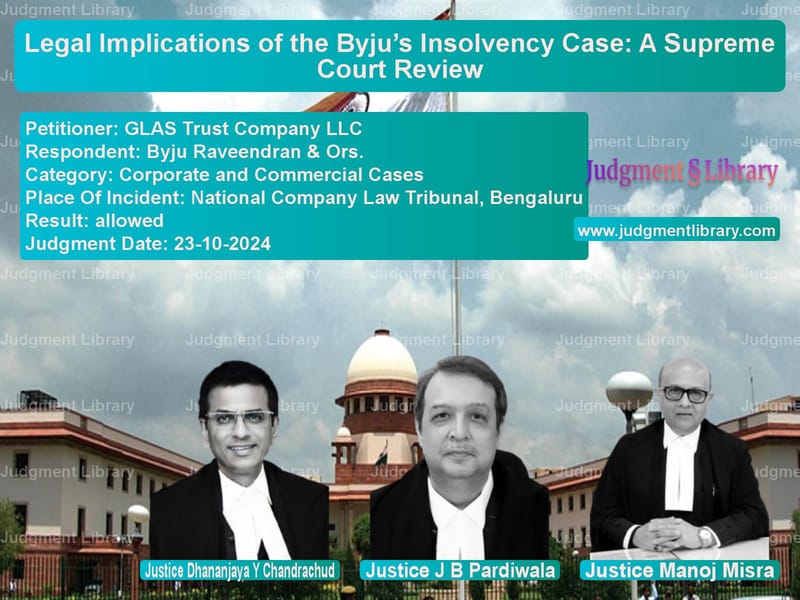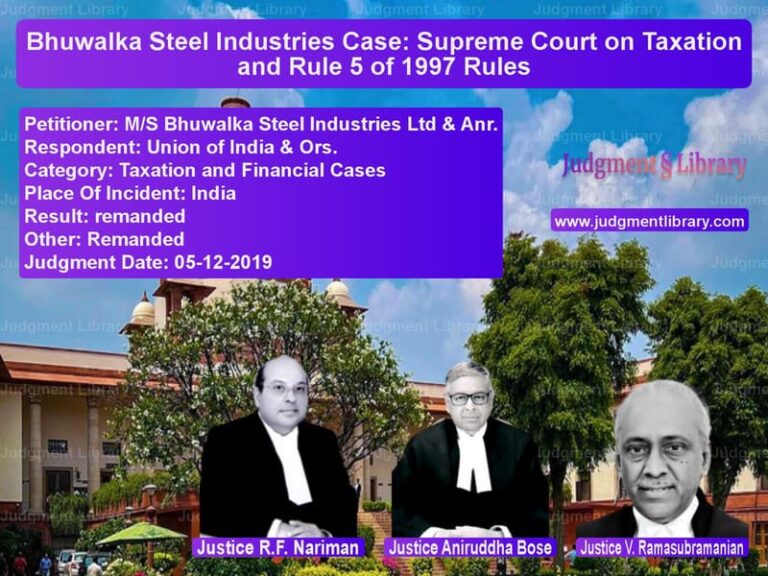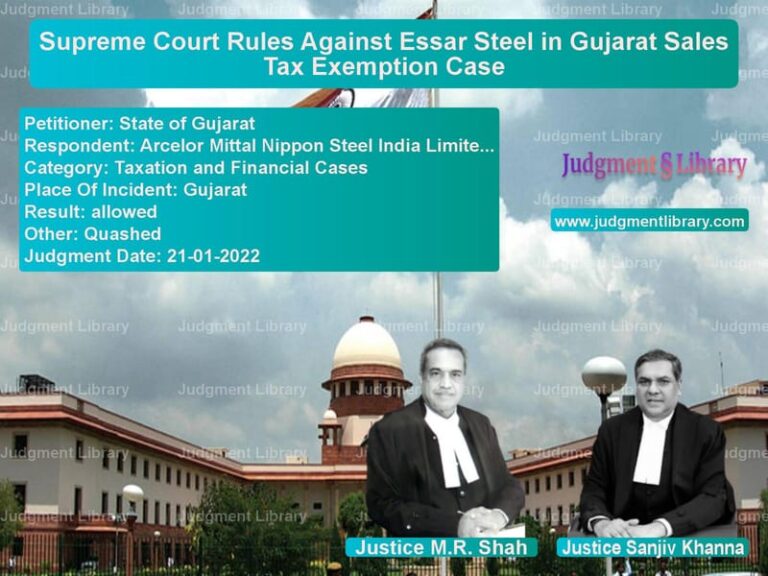Legal Implications of the Byju’s Insolvency Case: A Supreme Court Review
The recent Supreme Court judgment in GLAS Trust Company LLC v. Byju Raveendran & Ors. has garnered significant attention, particularly concerning corporate insolvency and settlement procedures under the Insolvency and Bankruptcy Code (IBC). This case primarily revolved around the settlement of corporate debts, the role of financial creditors, and the appropriate procedural framework for withdrawing a Corporate Insolvency Resolution Process (CIRP).
The matter originated from a dispute involving Think and Learn Pvt. Ltd. (commonly known as Byju’s), its promoters, and financial creditors. The case highlighted key aspects of the corporate resolution process, including claims by financial and operational creditors, objections to settlements, and jurisdictional issues spanning multiple legal forums, including the U.S. courts.
Background of the Case
1. Parties Involved
The case involved multiple stakeholders:
- The Appellant: GLAS Trust Company LLC, acting as an administrative and collateral agent for lenders who extended a $1.2 billion loan to Byju’s Alpha Inc., a subsidiary of Think and Learn Pvt. Ltd.
- The Respondents: Byju Raveendran and his brother, Riju Raveendran, former directors of Byju’s.
- The Operational Creditor: Board of Control for Cricket in India (BCCI), which had a financial claim of approximately Rs. 158 crore under a sponsorship agreement.
2. Legal Proceedings in the United States
GLAS Trust Company LLC alleged that Byju’s defaulted on its loan obligations. This led to litigation in the Delaware Bankruptcy Court, which issued an injunction against the transfer of approximately $533 million, suspected of being moved fraudulently to a hedge fund. The Delaware Court subsequently found Riju Raveendran in contempt, imposing financial penalties.
Read also: https://judgmentlibrary.com/supreme-court-upholds-nclats-order-in-uco-bank-loan-default-case/
3. Insolvency Proceedings in India
In September 2023, BCCI filed a petition under Section 9 of the IBC against Think and Learn Pvt. Ltd., which was admitted by the National Company Law Tribunal (NCLT) in July 2024. Simultaneously, GLAS Trust also filed a Section 7 petition as a financial creditor, which was dismissed in light of the existing CIRP initiated under BCCI’s petition.
Legal Issues Before the Supreme Court
1. Procedural Irregularities in Withdrawal of CIRP
During the CIRP, Byju’s proposed a settlement with BCCI, leading to the withdrawal of the insolvency process. The National Company Law Appellate Tribunal (NCLAT) approved this withdrawal under Rule 11 of the NCLAT Rules, despite objections from financial creditors. GLAS Trust Company LLC challenged this decision before the Supreme Court.
2. Financial Creditor’s Objections
GLAS Trust argued that the settlement was suspicious, alleging that the funds used for the settlement might be linked to the restricted assets under the Delaware Court’s injunction. The appellant contended that financial creditors were being deprived of a fair resolution process.
3. The Role of NCLAT in Granting Withdrawal
The Supreme Court examined whether NCLAT could invoke its inherent powers under Rule 11 when the IBC provided a specific procedure for withdrawal under Section 12A and Regulation 30A of the CIRP Regulations. The judgment emphasized that the prescribed framework must be followed and that the NCLT should adjudicate such matters.
Supreme Court’s Ruling
1. Setting Aside NCLAT’s Decision
The Supreme Court ruled in favor of GLAS Trust Company LLC, setting aside the NCLAT’s decision. The Court held that the settlement should have been processed through the prescribed IBC framework under Section 12A, requiring approval from 90% of the Committee of Creditors (CoC).
2. Importance of Collective Proceedings
The Court reaffirmed that once an insolvency petition is admitted, the process becomes a collective proceeding involving all creditors. The Supreme Court criticized the NCLAT for overriding the procedural safeguards designed to protect the rights of all stakeholders.
3. Protection of Financial Creditors’ Rights
The judgment underscored that financial creditors play a crucial role in insolvency proceedings. Approving a settlement favoring only operational creditors, while ignoring financial creditors, violates the principle of equitable distribution.
4. Need for Transparency in Settlement Transactions
The Supreme Court also noted the allegations of financial mismanagement, potential fund misappropriation, and pending investigations. The Court directed that the disputed settlement amount be placed in an escrow account pending further resolution.
Read also: https://judgmentlibrary.com/supreme-court-upholds-aeras-right-to-appeal-in-airport-tariff-disputes/
Conclusion and Implications
This ruling reaffirms the structured approach under the IBC, ensuring that insolvency proceedings are conducted transparently and equitably. It sends a strong message that settlements must follow due process and that the rights of financial creditors cannot be arbitrarily set aside.
The decision also underscores the increasing intersection of international legal proceedings with Indian insolvency cases, particularly in cases involving foreign creditors and offshore financial structures. This judgment is expected to serve as a precedent for future cases involving cross-border insolvency, financial mismanagement, and settlement approvals under the IBC.
Petitioner Name: GLAS Trust Company LLC.Respondent Name: Byju Raveendran & Ors..Judgment By: Justice Dhananjaya Y Chandrachud, Justice J B Pardiwala, Justice Manoj Misra.Place Of Incident: National Company Law Tribunal, Bengaluru.Judgment Date: 23-10-2024.
Don’t miss out on the full details! Download the complete judgment in PDF format below and gain valuable insights instantly!
Download Judgment: glas-trust-company-l-vs-byju-raveendran-&-or-supreme-court-of-india-judgment-dated-23-10-2024.pdf
Directly Download Judgment: Directly download this Judgment
See all petitions in Bankruptcy and Insolvency
See all petitions in Corporate Governance
See all petitions in Company Law
See all petitions in unfair trade practices
See all petitions in Enforcement of Awards
See all petitions in Judgment by Dhananjaya Y Chandrachud
See all petitions in Judgment by J.B. Pardiwala
See all petitions in Judgment by Manoj Misra
See all petitions in allowed
See all petitions in supreme court of India judgments October 2024
See all petitions in 2024 judgments
See all posts in Corporate and Commercial Cases Category
See all allowed petitions in Corporate and Commercial Cases Category
See all Dismissed petitions in Corporate and Commercial Cases Category
See all partially allowed petitions in Corporate and Commercial Cases Category







